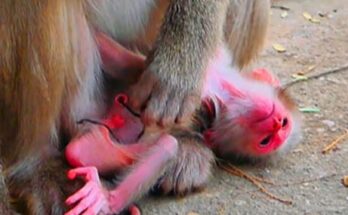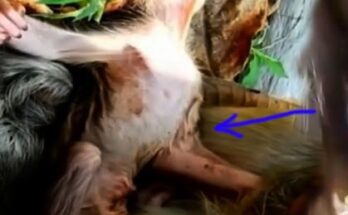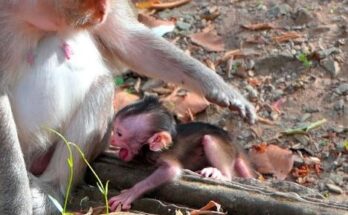In a forest typically filled with the vibrant sounds of life, a more somber story has quietly unfolded. A young monkey, new to the responsibilities of motherhood, has given birth to her first baby—but what should have been a joyful beginning has quickly become a fragile situation. Despite the natural instincts most primate mothers possess, the young female has shown little interest or ability to nurse her newborn, leaving the tiny infant weak, vulnerable, and in urgent need of intervention.
The mother, named Kira by the field researchers observing the troop, is barely out of adolescence. While she carried her pregnancy to term and delivered without complications, she appears overwhelmed by the responsibilities of maternal care. Instead of the close, nurturing contact typically seen between monkey mothers and their babies, Kira has remained detached. Her baby, born with a full coat of fur and the will to cling, has tried to nuzzle and nurse, but Kira’s inexperience and confusion have made the natural bond difficult to form.
Without regular feeding, the infant’s condition has started to decline rapidly. In the wild, a newborn monkey is dependent on its mother’s milk not only for nutrition but also for hydration, immune support, and comfort. Without it, the baby becomes increasingly lethargic. Observers have noted the infant’s weakening grip, its faint cries, and its shrinking energy—all signs that time is running out.
This heartbreaking situation is not uncommon among first-time mothers, especially young ones. In primate societies, maternal skills are often learned through observation and social experience. Older, experienced females may help raise younger siblings or observe other mothers before having offspring themselves. Unfortunately for Kira, she seems to have had limited opportunities to prepare. Whether due to social dynamics, isolation, or stress, she is struggling to respond to her baby’s needs.
Members of the troop have shown signs of concern. Several older females have approached Kira and her baby, sometimes attempting to groom or inspect the newborn. While their intentions appear gentle, Kira has remained unsure, often retreating or becoming defensive. The troop’s dominant female has been observed staying nearby, as if monitoring the situation—her presence could be crucial in influencing what happens next.
In situations like this, researchers and wildlife specialists often face difficult decisions. If the baby is to survive, human intervention may become necessary, particularly if the mother continues to reject nursing. Rescue efforts could involve supplemental feeding, temporary care by experienced foster monkeys, or reintroduction if bonding resumes. However, such steps are always weighed carefully to respect the integrity of the troop’s social structure and the wild setting.
For now, hope remains that Kira might still learn—perhaps through observation or with subtle support from the troop’s older members. But the clock is ticking. In the quiet shade of the forest canopy, a tiny life hangs in the balance, caught between instinct and inexperience, vulnerability and resilience.


